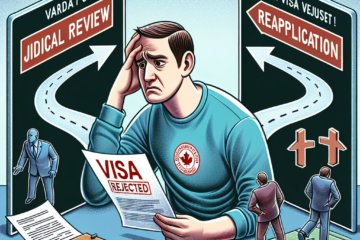In the intricate landscape of immigration law, obtaining a visa for Canada can sometimes be met with unexpected hurdles, including refusals. When faced with such a decision, applicants often feel disheartened and unsure of their next steps. However, the legal framework in Canada provides a mechanism known as judicial review, which serves as a potential avenue for overturning visa refusals. This article delves into the significance of judicial review, the role of the Federal Court in handling visa refusal cases, the procedural steps involved in initiating a judicial review, and the success rates and challenges associated with visa appeals.
Table of contents
Understanding the Role of Judicial Review in Canada
Judicial review is a fundamental component of the Canadian legal system, acting as a check on administrative decisions made by government bodies. In the context of visa refusals, it provides a mechanism for individuals to seek a review of the decision made by immigration authorities. The primary purpose of judicial review is not to challenge the decision itself but to assess the legality and fairness of the process through which the decision was made. It ensures that decision-makers have adhered to principles of natural justice and have not exceeded their jurisdiction.
In Canada, judicial review is not an automatic right but requires leave, or permission, from the Federal Court. This means that applicants must first convince a judge that there is a legitimate ground to challenge the decision. Grounds for judicial review often include errors of law, breaches of procedural fairness, or instances where the decision is deemed unreasonable. It is important to note that judicial review does not involve a re-evaluation of the facts but focuses on the decision-making process.
The role of judicial review extends beyond individual cases, as it also helps maintain the integrity of the immigration system. By holding decision-makers accountable, it ensures that immigration policies are applied consistently and fairly. This process not only protects the rights of individuals but also reinforces public confidence in the administrative justice system.
How Federal Court Handles Visa Refusal Cases
The Federal Court of Canada is the judicial body responsible for overseeing judicial review applications related to visa refusals. When a case is brought before the Federal Court, it undergoes a rigorous examination to determine whether the visa refusal was made in accordance with the law. The court’s role is to scrutinize the administrative decision to ensure that it was reached through a fair process and that the decision-maker did not overstep their legal bounds.
Once an application is filed, the Federal Court evaluates whether there is a reasonable basis for the judicial review. This involves an initial screening process where the applicant must demonstrate that there is a serious issue to be tried. If the court grants leave, the case proceeds to a full hearing where both the applicant and the government can present their arguments. The court then issues a decision, which can uphold the original refusal, set it aside, or remit it back for reconsideration by the immigration authorities.
The Federal Court’s handling of visa refusal cases is characterized by a focus on procedural fairness and adherence to legal standards. Judges in the Federal Court are tasked with ensuring that the principles of justice are upheld in all administrative decisions. This oversight acts as a safeguard against arbitrary or capricious decisions, ensuring that applicants are treated fairly and equitably.
Steps to Initiate a Judicial Review for Visas
Initiating a judicial review for visa refusals involves a structured process that begins with filing an application for leave to the Federal Court. The first step is to prepare a Notice of Application, which outlines the grounds for seeking a review and includes supporting documentation. This must be filed within a strict timeline, usually 15 days from the date of the refusal for cases within Canada, and 60 days for those outside Canada.
After filing the application, the next step is to serve it on the immigration authorities, providing them with an opportunity to respond. The applicant must also prepare an affidavit that contains evidence supporting their claim, along with a memorandum of argument that outlines the legal basis for the review. These documents are crucial as they form the foundation of the applicant’s case and persuade the court of the merits of the judicial review.
If the Federal Court grants leave, the case proceeds to a full hearing, where both parties can present oral arguments. During the hearing, the applicant has the opportunity to highlight any procedural errors or legal misinterpretations that may have occurred during the initial decision-making process. The court then deliberates and issues a ruling based on the arguments and evidence presented. Successful navigation of these steps requires a thorough understanding of the legal framework and often the assistance of legal professionals.
Success Rates and Challenges in Visa Appeals
The success rates of judicial reviews for visa refusals vary depending on the specifics of each case. While some applicants successfully overturn decisions, others may find that the court upholds the original refusal. Success in these cases often hinges on the ability to demonstrate significant procedural errors or legal misapplications that impacted the decision. Applicants must present a compelling case that highlights these issues effectively to increase their chances of success.
One of the primary challenges in pursuing a judicial review is the complexity of the legal process. Applicants must adhere to strict procedural requirements and timelines, which can be daunting without legal expertise. Additionally, judicial reviews focus on procedural fairness rather than re-examining the merits of the case, making it crucial to identify and articulate specific legal errors. This often requires a deep understanding of immigration law and the ability to navigate the intricacies of the judicial system.
Despite these challenges, judicial review remains a vital tool for those seeking to challenge visa refusals. It provides a formal avenue for ensuring that immigration decisions are made fairly and in accordance with the law. While not every application for judicial review results in a favorable outcome, the process itself upholds the principles of justice and accountability within the Canadian immigration system.
In conclusion, judicial review serves as a critical mechanism for addressing visa refusals in Canada, providing applicants with a pathway to challenge decisions they believe are unjust. The role of the Federal Court in overseeing these cases ensures that administrative decisions adhere to legal standards and procedural fairness. Although the process of initiating a judicial review can be complex and challenging, it remains an essential component of the immigration landscape, offering hope to those seeking to rectify unfavorable visa outcomes. Ultimately, judicial review not only protects individual rights but also reinforces the integrity and fairness of Canada’s immigration system.
Frequently Asked Questions
Frequently Asked Questions
What is a judicial review in the context of Canadian visa refusals?
A judicial review is a legal process where the Federal Court examines the fairness and legality of a visa refusal decision, ensuring that immigration authorities followed proper procedures.
Can a judicial review overturn a visa refusal decision?
A judicial review can potentially overturn a visa refusal if it finds that there were errors in the process. However, it does not re-evaluate the facts but rather focuses on the decision-making process.
What grounds are required to request a judicial review?
Applicants typically need to demonstrate that there was an error of law, a breach of procedural fairness, or unreasonable decision-making to justify a judicial review.
What role does the Federal Court play in visa refusal cases?
The Federal Court evaluates judicial review applications for visa refusals, checking if the original decision was made lawfully and without procedural errors.
Is judicial review an automatic right in Canada?
No, judicial review in Canada requires leave (permission) from the Federal Court. Applicants must show a legitimate reason for the review to proceed to a full hearing.
What are the procedural steps to initiate a judicial review?
Starting a judicial review involves filing a Notice of Application, providing supporting documents, serving immigration authorities, and potentially preparing for a full hearing if leave is granted.
How long do applicants have to file for judicial review?
For cases within Canada, applicants have 15 days to file, while those outside Canada have 60 days from the date of visa refusal.
What happens if the Federal Court grants leave for judicial review?
If the Federal Court grants leave, the judicial review proceeds to a full hearing where both sides present their arguments, and the court decides on the fairness and legality of the decision.
Can judicial review success rates vary?
Yes, success rates for judicial reviews vary, often depending on the presence of significant procedural errors or legal misapplications in the original decision.
What challenges do applicants face in pursuing judicial review?
Challenges include strict procedural requirements, complex legal processes, and a focus on procedural fairness rather than re-examining the case’s facts.
Is a judicial review the same as an appeal?
No, a judicial review is not an appeal. It examines the legality and fairness of the decision-making process rather than re-evaluating the facts of the case.
How can a lawyer assist with a judicial review?
A lawyer can guide applicants through the legal process, help prepare necessary documents, and present a strong case by identifying procedural errors in the visa refusal decision.
Are judicial reviews commonly successful?
Success depends on the specific circumstances of each case. Judicial reviews are successful if there is a demonstrable error or procedural unfairness in the decision process.
What happens if a judicial review is unsuccessful?
If unsuccessful, the original decision remains in effect, though applicants may explore other legal options or reapply under different conditions if eligible.
Can an applicant reapply for a visa after a judicial review?
Yes, applicants may reapply, but they should address any issues highlighted in the judicial review to improve their chances of approval.
How long does a judicial review process typically take?
The process varies but can take several months, depending on case complexity and court availability.
What documents are required for a judicial review?
Applicants need a Notice of Application, an affidavit with supporting evidence, and a memorandum of argument outlining the legal basis for the review.



0 Comments